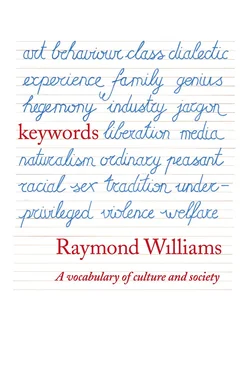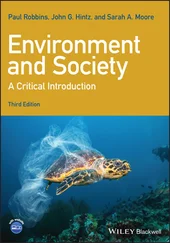Today I can explain what I believe was happening. Two important traditions were finding in England their effective formations: in the study of literature a decisive dominance of an idea of criticism which, from Arnold through Leavis, had culture as one of its central terms; and in discussions of society the extension to general conversation of an anthropological sense which had been clear as a specialist term but which now, with increased American influence and with the parallel influence of such thinkers as Mannheim, was becoming naturalized. The two earlier senses had evidently weakened: the teashop sense, though still active, was more distant and was becoming comic; the sense of activity in the arts, though it held its national place, seemed more and more excluded both by the emphasis of criticism and by the larger and dissolving reference to a whole way of life. But I knew nothing of this at the time. It was just a difficult word, a word I could think of as an example of the change which we were trying, in various ways, to understand.
My year in Cambridge passed. I went off to a job in adult education. Within two years T. S. Eliot published his Notes Towards the Definition of Culture (1948) – a book I grasped but could not accept – and all the elusive strangeness of those first weeks back in Cambridge returned with force. I began exploring the word in my adult classes. The words I linked it with, because of the problems its uses raised in my mind, were class and art , and then industry and democracy . I could feel these five words as a kind of structure. The relations between them became more complex the more I considered them. I began reading widely, to try to see more clearly what each was about. Then one day in the basement of the Public Library at Seaford, where we had gone to live, I looked up culture , almost casually, in one of the thirteen volumes of what we now usually call the OED: the Oxford New English Dictionary on Historical Principles . It was like a shock of recognition. The changes of sense I had been trying to understand had begun in English, it seemed, in the early nineteenth century. The connections I had sensed with class and art , with industry and democracy , took on, in the language, not only an intellectual but an historical shape. I see these changes today in much more complex ways. Culture itself has now a different though related history. But this was the moment at which an inquiry which had begun in trying to understand several urgent contemporary problems – problems quite literally of understanding my immediate world – achieved a particular shape in trying to understand a tradition. This was the work which, completed in 1956, became my book Culture and Society .
It was not easy then, and it is not much easier now, to describe this work in terms of a particular academic subject. The book has been classified under headings as various as cultural history, historical semantics, history of ideas, social criticism, literary history and sociology. This may at times be embarrassing or even difficult, but academic subjects are not eternal categories, and the fact is that, wishing to put certain general questions in certain specific ways, I found that the connections I was making, and the area of concern which I was attempting to describe, were in practice experienced and shared by many other people, to whom the particular study spoke. One central feature of this area of interest was its vocabulary, which is significantly not the specialized vocabulary of a specialized discipline, though it often overlaps with several of these, but a general vocabulary ranging from strong, difficult and persuasive words in everyday usage to words which, beginning in particular specialized contexts, have become quite common in descriptions of wider areas of thought and experience. This, significantly, is the vocabulary we share with others, often imperfectly, when we wish to discuss many of the central processes of our common life. Culture , the original difficult word, is an exact example. It has specialized meanings in particular fields of study, and it might seem an appropriate task simply to sort these out. But it was the significance of its general and variable usage that had first attracted my attention: not in separated disciplines but in general discussion. The very fact that it was important in two areas that are often thought of as separate – art and society – posed new questions and suggested new kinds of connection. As I went on I found that this seemed to be true of a significant range of words – from aesthetic to work – and I began collecting them and trying to understand them. The significance, it can be said, is in the selection. I realize how arbitrary some inclusions and exclusions may seem to others. But out of some two hundred words, which I chose because I saw or heard them being used in quite general discussion in what seemed to me interesting or difficult ways, I then selected sixty and wrote notes and short essays on them, intending them as an appendix to Culture and Society , which in its main text was dealing with a number of specific writers and thinkers. But when that book was finished my publisher told me it had to be shortened: one of the items that could be taken out was this appendix. I had little effective choice. I agreed, reluctantly. I put in a note promising this material as a separate paper. But the file of the appendix stayed on my shelf. For over twenty years I have been adding to it: collecting more examples, finding new points of analysis, including other words. I began to feel that this might make a book on its own. I went through the whole file again, rewrote all the notes and short essays, excluded some words and again added others. The present volume is the result.
I have emphasized this process of the development of Keywords because it seems to me to indicate its dimension and purpose. It is not a dictionary or glossary of a particular academic subject. It is not a series of footnotes to dictionary histories or definitions of a number of words. It is, rather, the record of an inquiry into a vocabulary : a shared body of words and meanings in our most general discussions, in English, of the practices and institutions which we group as culture and society . Every word which I have included has at some time, in the course of some argument, virtually forced itself on my attention because the problems of its meanings seemed to me inextricably bound up with the problems it was being used to discuss. I have often got up from writing a particular note and heard the same word again, with the same sense of significance and difficulty: often, of course, in discussions and arguments which were rushing by to some other destination. I began to see this experience as a problem of vocabulary , in two senses: the available and developing meanings of known words, which needed to be set down; and the explicit but as often implicit connections which people were making, in what seemed to me, again and again, particular formations of meaning – ways not only of discussing but at another level of seeing many of our central experiences. What I had then to do was not only to collect examples, and look up or revise particular records of use, but to analyse, as far as I could, some of the issues and problems that were there inside the vocabulary, whether in single words or in habitual groupings. I called these words keywords in two connected senses: they are significant, binding words in certain activities and their interpretation; they are significant, indicative words in certain forms of thought. Certain uses bound together certain ways of seeing culture and society, not least in these two most general words. Certain other uses seemed to me to open up issues and problems, in the same general area, of which we all needed to be very much more conscious. Notes on a list of words; analyses of certain formations: these were the elements of an active vocabulary – a way of recording, investigating and presenting problems of meaning in the area in which the meanings of culture and society have formed.
Читать дальше












